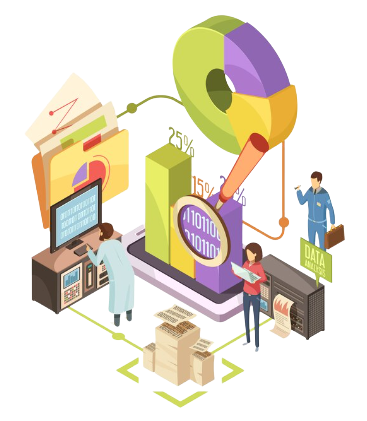Big Data for Small Businesses is not just for big corporations—it’s a game-changer for small businesses too. By embracing big data, small businesses can pave the way for growth, innovation, and lasting success in an increasingly data-driven business landscape.
In the digital age, data is the new currency, and businesses of all sizes are recognizing its value. While big corporations have been leveraging big data for years, small businesses are now realizing that they too can harness the power of data to make informed decisions, drive growth, and gain a competitive edge. In this blog post, we’ll explore the world of big data for small businesses, uncover its practical applications, and highlight the numerous benefits that come with it.
Understanding of Big Data for Small Businesses
Before delving into how small businesses can benefit from big data, let’s clarify what big data means. Big data refers to vast volumes of structured and unstructured data that inundate a business daily. This data is characterized by its volume, velocity, variety, and complexity. It includes information from various sources such as customer interactions, social media, sensors, and more.

Practical Applications of Big Data for Small Businesses
-
Customer Insights and Personalization
Understanding your customers is key to success. Big data analytics allows small businesses to collect and analyze customer data to gain valuable insights. This information can be used to personalize marketing campaigns, recommend products, and improve customer experiences.
-
Inventory Management
Efficient inventory management is crucial for small businesses. Big data analytics helps in predicting demand patterns, optimizing stock levels, and reducing the costs associated with excess inventory.
-
Fraud Detection
Small businesses are not immune to fraud. Big data tools can identify unusual patterns and behaviors in financial transactions, helping to detect and prevent fraudulent activities.
-
Market Research
Market research is essential for making informed business decisions. Big data can provide real-time market insights, helping small businesses identify trends, monitor competitors, and seize opportunities.
-
Social Media Marketing
Social media platforms generate vast amounts of data. Small businesses can use big data analytics to measure the effectiveness of their social media campaigns, identify customer sentiment, and tailor content accordingly.
Benefits of Big Data for Small Businesses
-
Informed Decision-Making
Big data provides businesses with the information they need to make data-driven decisions rather than relying on intuition alone. This leads to more informed choices and better outcomes.
By analyzing data on customer behavior, market trends, and operational efficiency, They can make strategic decisions that align with their goals and drive growth. For example, a restaurant owner can analyze sales data to determine which menu items are most popular and adjust the menu accordingly.
-
Cost Reduction
It can significantly reduce costs by optimizing processes, inventory management, and marketing efforts. Big data analytics helps identify areas where savings can be made.
For instance, a small manufacturing company can use predictive maintenance based on machine sensor data to reduce equipment downtime and maintenance costs. This ensures that maintenance is performed only when necessary, avoiding unnecessary expenses.
-
Improved Customer Satisfaction
Personalization and better customer experiences lead to higher customer satisfaction. Satisfied customers are likelier to become loyal and recommend your business to others.
Small businesses can use big data to create personalized experiences for their customers. For example, an e-commerce site can recommend products based on a customer’s browsing and purchase history, increasing the likelihood of a sale.
-
Competitive Advantage
It can gain a competitive advantage by using big data to identify trends and opportunities faster than competitors. This agility allows them to adapt and innovate more effectively.
For instance, a small software development company can use big data to analyze customer feedback and spot emerging trends in software preferences. This can lead to the development of new features or products that cater to changing customer needs before larger competitors can react.
-
Scalability
As it grows, big data solutions can scale with them. This scalability ensures that data analytics continues to provide valuable insights as the business expands.
It can start with basic data analytics tools and gradually upgrade to more advanced solutions as its data needs grow. This flexibility allows them to maintain a competitive edge without overwhelming their budgets.
Challenges and Considerations
While the benefits of big data for small businesses are substantial, there are challenges to consider. These include:
-
Data Privacy and Security
Small businesses must ensure that customer data is protected and compliant with data privacy regulations. Data breaches can be costly and damage a business’s reputation.
To address this challenge, small businesses should implement robust data security measures, regularly update their cybersecurity protocols, and educate employees about data protection.
-
Skilled Personnel
Effective use of big data requires skilled personnel who can manage and analyze data. They may need to invest in training or hire data analysts with the necessary expertise.
-
Implementation Costs
Implementing big data solutions can involve initial costs for hardware, software, and training. They should carefully evaluate their budgets and consider the return on investment (ROI) when implementing big data initiatives.
Conclusion
In a world where information is abundant, small businesses can no longer afford to ignore the potential of big data. The practical applications and benefits of harnessing data analytics are undeniable. Whether it’s gaining customer insights, optimizing operations, or gaining a competitive edge, Tanbits‘ big data services empower small businesses to thrive in today’s data-driven landscape.
As you embark on your journey into the world of big data, remember that knowledge is power, and with the right tools and strategies, your small business can make the most of this invaluable resource. Big Data for Small Businesses is not just for big corporations—it’s a game-changer for small businesses too. By embracing big data, small businesses can pave the way for growth, innovation, and lasting success in an increasingly data-driven business landscape.
BACK










